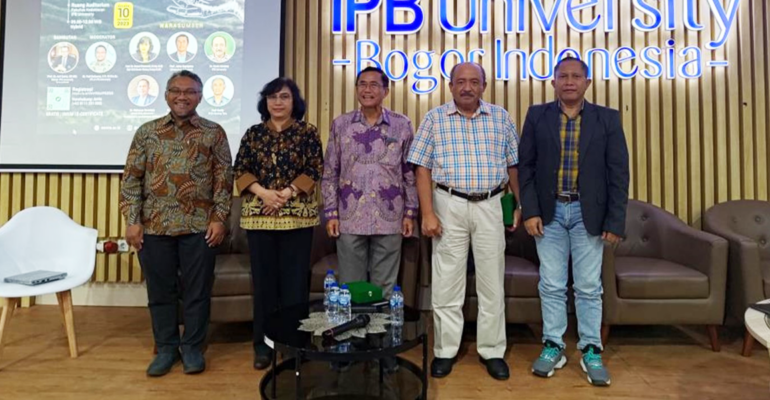PPLH IPB University Reminds the Importance of Integrating Energy Transition with Land Ecosystem Conservation

In supporting efforts to implement Nationally Determined Contributions (NDC) as part of climate change mitigation, various countries in the world are committed to developing sustainable energy. On the other hand, renewable energy production poses a high risk of damage to terrestrial ecosystems and a decline in biodiversity.
The Chief of the Environmental Research Centre (PPLH) of IPB University, Dr Yudi Setiawan emphasised that a conservation approach in the energy transition is a necessity, shifting from fossil fuel-based energy to clean energy for sustainable development.
“Of course, the target of this energy transition is to maintain ecosystem conservation, especially the conservation of terrestrial ecosystems,” he said during the seminar ‘Integration of Energy Transition with Terrestrial Ecosystem Conservation’ at the Auditorium Room of the Faculty of Medicine, IPB University, recently.
Dr Yudi added that there was a need for alignment between policy and biodiversity conservation in the energy transition to reduce the risk of damage to terrestrial ecosystems. Economic valuation is also considered to be an important thing to do so that terrestrial ecosystems can have an important value in energy transition efforts.
At the seminar held by PPLH IPB University together with Environment Institute Indonesia (Enviro) and the Climate Change and Forestry Expert Network (APIK) Indonesia Network, the Expert Staff of the Minister of Environment and Forestry, Prof Haruni Krisnawati, was also present.
Prof Haruni explained the policy direction of the environment and forestry sector to support the energy transition. She said that the current condition is that the majority of the primary energy mix of power plants in Indonesia still comes from coal (87.21 percent). The rest comes from gas (15.96 percent) and fuel oil (2.73 percent).
“The mix of new renewable energy (EBT) reached 14.11 per cent. In the future, the target is to use EBT at least 23 percent by 2025 and at least 31 percent by 2050,” he concluded.
Elaborating on what Prof Haruni said, Dr Ucok WR Siagian from the Bandung Institute of Technology (ITB) said that the energy diversification target that leads to a reduction in the role of fossil fuels does not only target the motor vehicle sector as a means of transportation. Later, the industrial sector is expected to slowly implement the use of sustainable environmentally friendly energy.
Dr Mahawan Karuniasa, Chief Executive Officer (CEO) of Enviro Indonesia, said that the current condition of global warming and weather anomalies is the result of the use of fossil fuels that are not environmentally friendly. He is of the view that a positive change in public perception towards the use of an environmentally friendly energy sector is needed. This is because it will support the integration of NDC implementation in the energy sector and terrestrial ecosystem conservation.
On the same occasion, IPB University lecturer from the Department of Forest Resource Conservation and Ecotourism (KSHE), Faculty of Forestry and Environment (Fahutan), Dr Nyoto Santoso emphasised the need for support from business actors harvesting renewable energy sources for the existence of communities to help maintain the sustainability of energy resources.
“For example, conservation of forest resources is needed to keep the forest green, which also requires community support. If forests are maintained, water sources from upstream as a source of energy for hydropower plants (PLTA) will remain sustainable,” he explained.
This was confirmed by Hadi Susilo, a representative of the Batang Toru hydropower plant management. According to him, electricity from water resources has several advantages, one of which is producing environmentally friendly energy without causing pollution. “Hydropower energy encourages the potential for groundwater conservation as well as greening to generate water mines,” he explained.
On the other hand, biodiversity conservation expert Prof Jatna Supriatna emphasised the need for caution in managing potential renewable energy sources that intersect with conservation areas. This is because Indonesia has the highest biodiversity in the world. (*/Rz) (IAAS/RUM)



